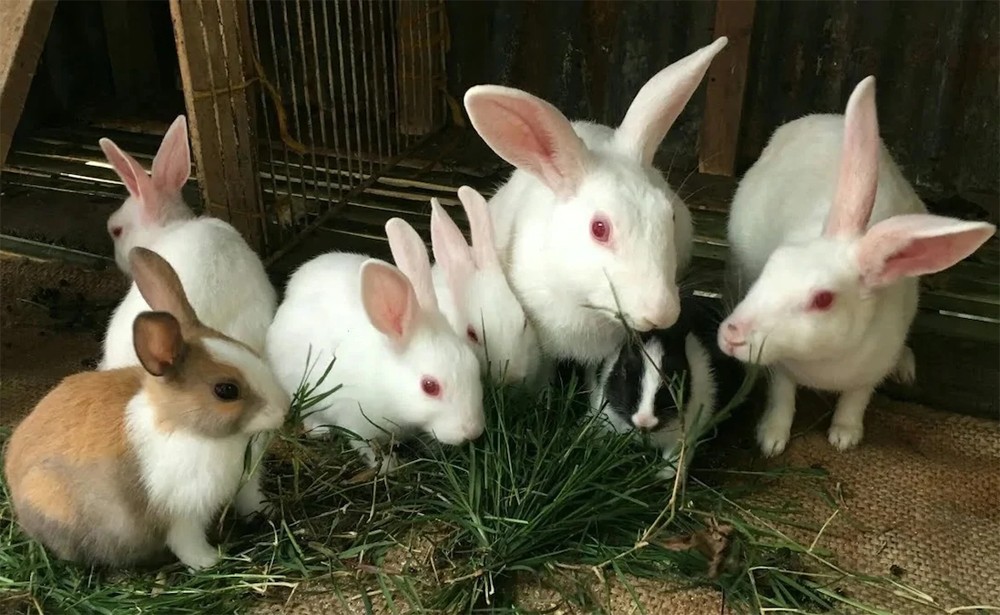
Raising rabbits is an often overlooked yet highly profitable venture that combines delicious meat with the potential for significant income. This business opportunity is ripe for exploration, especially in Nigeria and the broader African context, where both the meat and skin of rabbits are in demand. In this article, I share my experience in working extensively with rabbits for many years as a researcher and a rabbit farmer. I will delve into the business of raising rabbits, explore the global market for rabbit products, and discuss effective marketing strategies. This valuable information could be the key to your next successful agribusiness venture.
The Allure of Rabbit Meat
Rabbit meat is a culinary delight known for its juiciness, tenderness and flavor. It’s also a healthy choice, boasting high protein content and lower fat and cholesterol compared to other meats. These attributes make it an appealing option for health-conscious consumers and gourmet chefs alike.
The Business of Raising Rabbits
Starting a rabbit farming business can be relatively low-cost and requires minimal space compared to other livestock. Here’s how you can get started:
- Choosing the Right Breed: Selecting the appropriate breed is crucial for both meat and skin production. Popular meat breeds include the New Zealand White and the Californian, known for their rapid growth and high-quality meat. For skin production, breeds with dense, high-quality fur, such as the Chinchilla or Rex, are ideal.
- Housing and Care: Rabbits need clean, dry, and well-ventilated housing. Hutches or cages should be spacious enough to allow for movement. Providing a balanced diet, regular health check-ups, and a clean environment are essential for maintaining healthy rabbits.
- Breeding and Growth: Rabbits have a high reproductive rate, which means you can quickly expand your herd. A single doe (female rabbit) can produce up to 35 offspring per year. Efficient breeding programme and proper management ensure a steady supply of rabbits for meat and skin production.
Market Potential and Strategies
The market for rabbit products is diverse and global. Here’s a breakdown of the different products and effective marketing strategies:
1. Rabbit Meat:
- Local Markets: In Nigeria and other African countries, rabbit meat can be sold directly to consumers, individuals and families who are particular about the quality of meat they consume. Establishing relationships with local butchers, supermarkets and chain stores, ‘A’- list hotels and restaurants can create a steady demand. Smoked or barbequed rabbit is a delight for many consumers.
- Export Opportunities: There is a growing international market for rabbit meat, particularly in Europe and Asia. Meeting international standards for meat processing and packaging can open up lucrative export opportunities.
2. Rabbit Skin and Fur:
- Fashion Industry: Rabbit fur is highly valued in the fashion industry for its softness and warmth. Selling pelts to furriers and fashion designers can be profitable.
- Crafts and Accessories: Rabbit skins can be used to make a variety of products, from gloves and hats to decorative items. Partnering with local artisans and craft shops can help in marketing these products.
3. Other markets for rabbits
You will not believe the number of research institutions and teaching Hospitals that use rabbits as laboratory animals. Also, nearly all schools that are well-informed utilize rabbits for biology and agriculture practical classes.”
4. Rabbit manure and urine:
Rabbit manure and urine are incredibly beneficial byproducts of rabbit farming that can significantly enhance soil health, plant growth, and pest management. By incorporating these natural fertilizers into agricultural practices, farmers and gardeners in Nigeria and other parts of Africa can promote sustainable farming, improve crop yields, and reduce reliance on chemical inputs. Embracing the full potential of rabbit farming not only boosts profitability but also contributes to a healthier, more sustainable environment.
Effective Marketing Strategies
To maximize profits, it’s essential to implement effective marketing strategies tailored to different products:
- Building an Online Presence: Creating a professional website and utilizing social media platforms can help reach a broader audience. Highlighting the health benefits of rabbit meat and showcasing products made from rabbit fur can attract potential customers.
- Participating in Trade Shows and Expos: Attending agricultural and food industry trade shows can provide valuable exposure. These events are great for networking with potential buyers and learning about the latest trends in the industry.
- Creating a Brand: Developing a strong brand identity that emphasizes quality and sustainability can differentiate your products from competitors. Packaging, logos, and consistent messaging are key elements of effective branding.
- Direct Sales and Farm Tours: Offering farm tours and direct sales to consumers can build trust and create loyal customers. This approach is particularly effective for local markets, where consumers value knowing the source of their food.
The Profitable Future of Rabbit Farming
Rabbit production is not only interesting, but also a profitable venture with vast market potential. By focusing on high-quality breeds, efficient farming practices, and strategic marketing, you can tap into a growing demand for rabbit meat and skins.
For those in Nigeria and other parts of Africa, this agribusiness offers an opportunity to diversify income sources and contribute to local economies. The low start-up costs and high reproductive rates make it an accessible and scalable business.
If you found this article valuable and are eager to dive into the rabbit farming business, please drop your comments and question below. Also, consider subscribing to our newsletter for more in-depth guides and tips. Together, we can unlock the potential of this profitable venture and make a mark in the global market.

